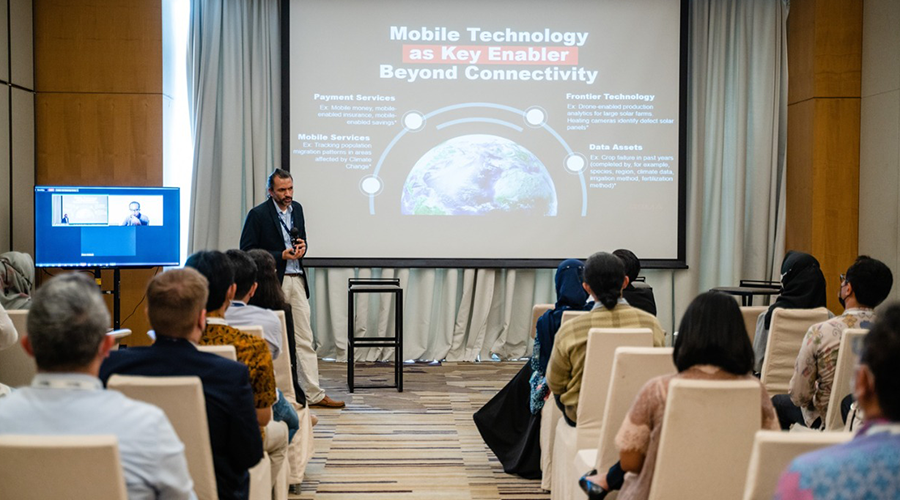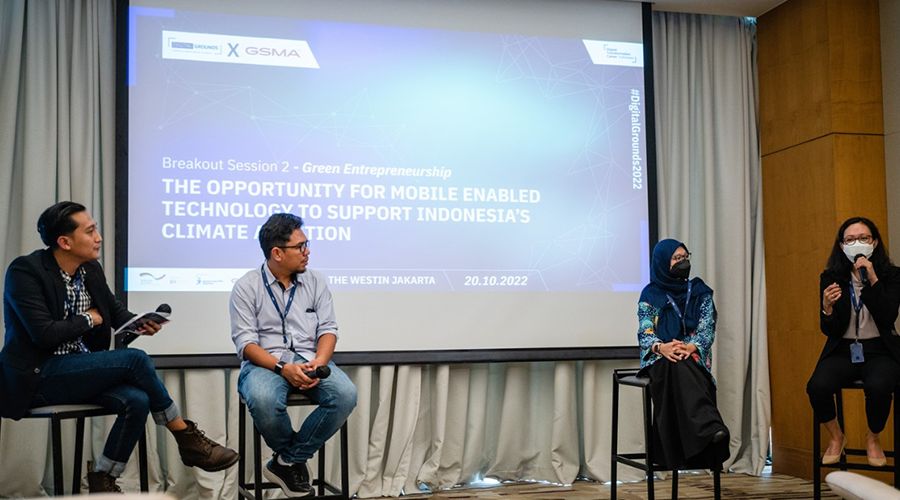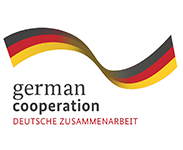On 20 October 2022, the Deutsche Gesellschaft für Internationale Zusammenarbeit (GIZ) GmbH Indonesia and the Ministry of National Development Planning of the Republic of Indonesia (Bappenas) hosted an invitation-only event ‘Digital Grounds: Towards a Green Digital Economy’ in Jakarta. The event focused on accelerating digital transformation and the green economy in Indonesia, encouraging knowledge sharing among ecosystem participants such as the government representatives, start-ups, and micro, small, and medium-sized enterprises (MSMEs), and providing information on the adoption of digital technology by MSMEs.
The GSMA Mobile Innovation Hub (MIH) Indonesia team led one of the breakout sessions with the launch of a report titled ‘The state of mobile-enabled climate technology in Indonesia‘. The session explored the potential for mobile-enabled technology solutions to enhance Indonesia’s climate mitigation and adaptation efforts.
Daniel Schroeder, Lead Adviser for Digital Transformation Centre (DTC) Indonesia, opened the session by emphasising the importance of mobile technology to enhance climate actions through connectivity usage. Daniel also outlined DTC’s plans to use technology as one of the primary forces in creating, advancing, and enabling platforms for the country’s digital transformation through its collaboration with the GSMA MIH Indonesia.
Novi Arian, Head of New Ventures and Technology Incubation at XL Axiata showcased the XL Axiata Innovation Centre, X-camp, which aims to stimulate the Internet of things (IoT) market in Indonesia. X-camp aims to be an enabler that accelerates the development of IoT ecosystem to support developers from start-ups, academics, universities, or entrepreneurs to create their digital products.
Dulip Tillekeratne, Market Engagement Director of MIH Indonesia, then shared key insights from the report, highlighting the potential to utilise mobile-enabled climate technology to support Indonesia’s climate goals and walked through some of the main barriers identified in the report:
- technical barriers such as connectivity,
- political barriers such as complex administrative ecosystems that hinder collaboration, and
- behavioural barriers where communities in the most sensitive regions are still reluctant to adopt climate tech solutions.

The session continued with a panel discussion with leading industry experts from XL Axiata, BAKTI Kominfo (Special task force under Ministry of Communication and ICT Indonesia), and EY Indonesia.

Novi Arian, Head of New Ventures and Technology Incubation at XL Axiata showcased the XL Axiata Innovation centre, X-camp, which aims to stimulate the Internet of things (IoT) market in Indonesia. X-camp aims to be an enabler that accelerates the development of IoT ecosystem to support developers from start-ups, academics, universities, or entrepreneurs to create their digital products.
Ari Soegeng Wahyuniarti, Head of Information and Telecommunication Services for the Community of BAKTI Kominfo, highlighted examples of having an ecosystem approach to improve communities’ digital literacy and effectively adopt technology in reaching climate goals. BAKTI Kominfo has conducted numerous digital literacy training programmes tailored to address the needs of remote communities in Indonesia, in partnership with start-ups, local communities, private sector and other ministries.
Ika Merdekawati, Senior Manager of Climate Change and Sustainability Services at EY Indonesia shared a more theoretical perspective, helping the participants understand more about climate change and the different needs to reduce emissions across industries. Understanding this as the foundation of collaboration is crucial to achieving greater impact on climate goals.
The panelists then engaged in a lively discussion with the audience about how digital technology solutions could be leveraged to promote climate action across many sectors and ultimately aid Indonesia to achieve its climate targets. The new GSMA report was acknowledged as a useful reference point in building the climate technology narrative.
Download the full report here.
Watch the report summary video here.
The Mobile Innovation Hub is funded by the German Federal Ministry for Economic Cooperation and Development (BMZ), and supported by the GSMA and its members.



